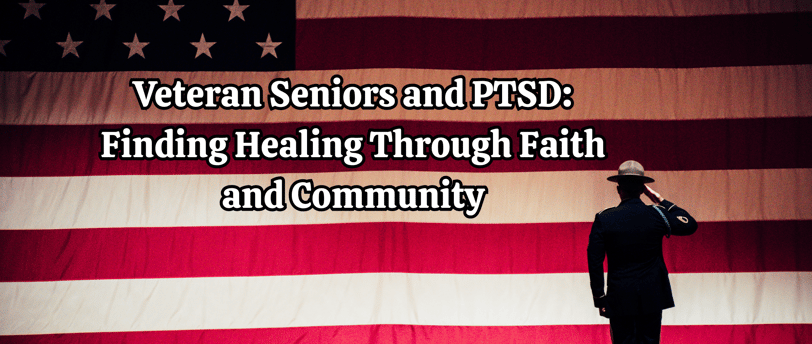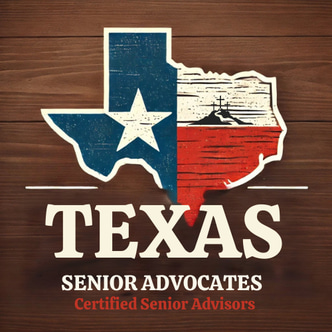Veteran Seniors and PTSD: Finding Healing Through Faith and Community


Veteran Seniors and PTSD: Finding Healing Through Faith and Community
"He heals the brokenhearted and binds up their wounds." — Psalm 147:3 (NASB)
The nightmares that began in the jungles of Vietnam, the desert sands of Iraq, or the mountains of Afghanistan don't always fade with time. For many Texas veteran seniors, the transition from active duty to civilian life, and now to their golden years, has been marked by an invisible companion: Post-Traumatic Stress Disorder. What was once dismissed as "shell shock" or "battle fatigue" is now recognized as a real condition affecting warriors long after the shooting stops.
Renowned pastor and theologian Tim Keller offered profound insight into the human condition when he wrote, "We are more sinful and flawed in ourselves than we ever dared believe, yet at the very same time we are more loved and accepted in Jesus Christ than we ever dared hope." For veteran seniors struggling with PTSD, this truth speaks directly to the shame, guilt, and sense of brokenness that often accompany their invisible wounds.
Understanding PTSD in Senior Veterans
Post-Traumatic Stress Disorder doesn't respect rank, branch of service, or years of faithful civilian life. Many Texas senior veterans find that PTSD symptoms actually worsen with age, as retirement removes the distractions of work and family responsibilities, leaving more time for painful memories to surface.
Delayed Onset PTSD: Some veterans experience their first significant PTSD symptoms decades after service, often triggered by life changes, health issues, or the loss of fellow veterans. The quiet of retirement can make war memories louder than they've ever been.
Anniversary Reactions: Significant dates—deployment anniversaries, dates of combat actions, or memorial days—can trigger intense emotional responses even years later. Texas veterans may find themselves struggling during specific seasons without understanding why.
Survivor's Guilt: Many senior veterans carry deep guilt about surviving when buddies didn't, making choices in combat, or feeling like they haven't honored the sacrifice of fallen comrades through their civilian lives.
Hypervigilance and Control: The survival skills that kept veterans alive in combat—constant alertness, need for control, difficulty trusting others—can create challenges in family relationships and social situations decades later.
The Intersection of Faith and Trauma
Keller's observation about human nature addresses one of PTSD's most destructive elements: shame. Many veteran seniors struggle with intense shame about their combat experiences, their emotional struggles, or their inability to "just get over it." Faith offers a different narrative.
Acknowledging Brokenness Without Shame: The Christian understanding of human fallenness means that we're all broken—not just veterans, not just those with PTSD. Your trauma responses don't make you more sinful or less worthy than anyone else.
Unconditional Love Despite Invisible Wounds: God's love for you isn't diminished by flashbacks, nightmares, or emotional numbness. Christ's acceptance isn't conditional on your ability to overcome PTSD or maintain perfect emotional control.
Purpose in Pain: While God doesn't cause PTSD, He can use your experience to minister to other struggling veterans, develop character qualities that bless your family, and demonstrate His sustaining grace to a watching world.
Community Without Judgment: The body of Christ provides a place where veterans can be honest about their struggles without fear of judgment or dismissal.
Practical Steps Toward Healing
Seek Professional Help: Getting counseling or psychiatric care isn't a sign of weakness—it's wise stewardship of your mental health. Many Texas VA facilities offer specialized PTSD treatment programs designed specifically for senior veterans.
Connect with Veteran Communities: Organizations like Veterans of Foreign Wars (VFW), American Legion, and Texas-specific veteran groups provide fellowship with others who understand military experience. Sharing stories with fellow veterans can be deeply healing.
Explore Faith-Based Counseling: Christian counselors who understand both trauma recovery and biblical principles can help you process your experiences within a framework of faith. They can address both psychological healing and spiritual questions.
Develop Healthy Routines: Structure and routine, familiar from military life, can provide stability for PTSD recovery. Regular sleep schedules, exercise, and spiritual disciplines create predictable anchors in emotional storms.
Practice Grounding Techniques: When flashbacks or panic attacks occur, grounding techniques—focusing on present surroundings, deep breathing, or reciting Scripture—can help bring you back to the present moment.
Addressing Common Spiritual Struggles
"Where was God during combat?": This question haunts many veteran seniors. While complete answers may not come this side of heaven, faith affirms that God grieves with those who suffer and promises ultimate justice and healing.
"How can a loving God allow war?": The existence of war reflects humanity's fallen condition, not God's character. God's heart breaks over the violence and trauma that war creates, even when He uses imperfect human institutions to accomplish His purposes.
"I've done things that God can't forgive": No sin—including those committed in the heat of combat—is beyond God's forgiveness through Christ. Veterans have received full pardon for every action, decision, and consequence of their service.
"I don't deserve help or healing": This lie contradicts the gospel. God's grace isn't earned through perfect service or emotional stability. His healing is available to all who seek it, regardless of their past.
"My faith should be stronger than this": PTSD is a medical condition, not a spiritual failing. Having trauma responses doesn't indicate weak faith any more than having diabetes indicates weak faith.
Family and Relationship Healing
PTSD affects not just veterans but their entire families. Spouses, children, and grandchildren often bear the impact of trauma responses, emotional distance, or unpredictable behavior.
Honest Communication: Family members need education about PTSD to understand that irritability, withdrawal, or hypervigilance aren't personal rejections but trauma responses. Open conversation about symptoms and triggers helps everyone navigate relationships more effectively.
Professional Family Therapy: Many counselors specialize in helping military families understand and heal from the collective impact of PTSD. This isn't about blame but about building healthier patterns of interaction.
Patience with Process: Healing from decades-old trauma takes time. Family members need realistic expectations about recovery timelines while maintaining hope for improvement.
Creating Safety: Both veterans and family members need to feel emotionally and physically safe. This might mean establishing new boundaries, communication patterns, or household routines that account for PTSD symptoms.
Texas-Specific Resources
VA Medical Centers: Texas has numerous VA facilities offering specialized PTSD treatment, including centers in Houston, Dallas, San Antonio, and Austin with programs specifically for senior veterans.
Vet Centers: These community-based centers provide counseling and support specifically for combat veterans and their families, often with more flexible scheduling than larger VA hospitals.
Texas Veterans Commission: State-specific resources and advocacy for veteran benefits, including mental health services and community support programs.
Faith-Based Organizations: Many Texas churches and Christian organizations offer veteran-specific ministries, support groups, and counseling services that integrate faith and trauma recovery.
Finding Hope in Brokenness
David's words in Psalm 147:3 about God healing the brokenhearted and binding wounds speak directly to veteran seniors carrying invisible injuries. The God who sees every sparrow that falls certainly sees the veteran who startles at loud noises or struggles with nightmares decades after service.
Keller's insight about being "more loved and accepted in Jesus Christ than we ever dared hope" provides the foundation for healing. Your worth isn't determined by your emotional stability, your ability to overcome trauma, or your success in civilian life. Your value rests in Christ's love, which is stronger than any wound and more persistent than any nightmare.
The healing process may be long and non-linear. Some days will be better than others. Setbacks don't indicate failure, and seeking help doesn't indicate weakness. The same courage that carried you through military service can carry you through the journey of healing.
Your service mattered. Your sacrifice was real. Your struggles are valid. And your healing—however long it takes—honors both your service and the God who created you for wholeness.
You served your country with honor. Now let others serve you in your healing. God sees your invisible wounds and offers His gentle hands to bind them up.
